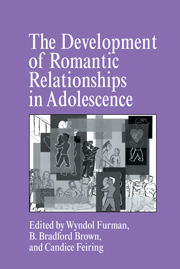Book contents
- Frontmatter
- Contents
- Contributors
- Foreword
- Acknowledgments
- 1 Missing the Love Boat: Why Researchers Have Shied Away from Adolescent Romance
- Part I Processes in Romantic Relationships
- Part II Individual Differences in Romantic Relationships
- Part III The Social Context of Romantic Relationships
- Part IV Conclusion
- Author Index
- Subject Index
Foreword
Published online by Cambridge University Press: 05 October 2014
- Frontmatter
- Contents
- Contributors
- Foreword
- Acknowledgments
- 1 Missing the Love Boat: Why Researchers Have Shied Away from Adolescent Romance
- Part I Processes in Romantic Relationships
- Part II Individual Differences in Romantic Relationships
- Part III The Social Context of Romantic Relationships
- Part IV Conclusion
- Author Index
- Subject Index
Summary
Once the exclusive domain of poets, novelists, artists, and musicians, romance has been claimed as a legitimate subject by social scientists. Since the beginning of the modern era in sociology, anthropology, psychology, and psychiatry, an immense and diverse literature has accumulated on romantic relationships. A vast number of works now catalog the varieties of romantic attachments that characterize human beings, the role of romantic relationships in reproduction and their functions in evolution, cultural variations, their cognitive and emotional bases, and ethical and legal issues involving them.
The vast majority of these inquiries into romantic activity concern relationships among adults – mostly adults in their 20s and 30s. Far fewer studies deal with romantic relationships in middle and old age; a relatively small number focus on these relationships in adolescence; and romantic relationships between children have been completely ignored, although, some years ago, Elaine Hatfield developed a questionnaire instrument that she called the Juvenile Love Scale. Even when adolescents are studied, attention is usually focused on dating relationships (which may or may not be romantic, depending on the definition) or sexual activity (which may or may not occur in the context of romantic relationships). Consequently, one can argue that a developmental psychology of romantic relationships scarcely exists.
- Type
- Chapter
- Information
- The Development of Romantic Relationships in Adolescence , pp. xi - xviPublisher: Cambridge University PressPrint publication year: 1999
- 1
- Cited by



